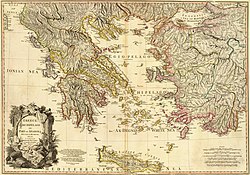Greek War of Independence (1821–1828)
| History of Greece |
|---|
 |
- 1821, 21 February: Revolt of Greek War of Independence from the Ottoman Empire declared by Alexandros Ypsilantis in Wallachia (Iaşi).
- 1821, 25 March: According to tradition, Metropolitan Germanos of Patras blesses a big Greek flag at the Monastery of Agia Lavra in Peloponnesia and proclaims to people assembled the beginning of a Greek Revolution. [1] [2] Greece declares its independence. Beginning of the Greek War of Independence.
- 1821, 10 April, Easter Monday: Ecumenical Patriarch Gregory V of Constantinople Alyssa central outside portal of the Patriarchate by the Turks. The door has remained shut and out of use ever since [3]
- 1821, 17 April: Former Ecumenical Patriarch Cyril VI is hanged in the gate of the Adrianople's cathedral [4]
- 1821, 4 April: Constantine Mourousis, Dimitrios Paparigopoulos and Antonios Tsouras are decapitated by the Ottomans in Constantinople [5]
- 1821, 5 April: The Phanariotes Petros Tsigris, Dimitrios Skanavis and Manuel Hotzeris are decapitated by the Turks, while Georgios Mavrocordatos is hanged by the Sultan forces in Constantinople [5]
- 1821, 23–24 April: Battle of Alamana. After the Greek defeat, Athanasios Diakos is impaled on a spit.
- 1821, 4 May: Metropolitans Gregorios of Derkon, Dorotheos of Adrianople, Ioannikios of Tyrnavos, Joseph of Thessaloniki, and the Phanariote Georgios Callimachi and Nikolaos Mourousis are decapitated on Sultan's orders in Constantinople [5]
- 1821, May: The Turkish governor Yusuf Bey orders his men to kill every Greek in Thessaloniki that they find. The killings last for days, with the metropolitan and major notables among the victims [6]
- 1821, 2 June: Destruction of Kydonies in Asia Minor by the Ottoman army. Tens of thousands of Greek inhabitants become refugees [7]
- 1821, 24 June: The massacre of Heraklion or 'the great ravage' occurs against the Greek community in Crete. Among the victims are the metropolitan of Crete and bishops [8]
- 1821, 9 July: The chief of the Cypriot Orthodox Church Archbishop Kyprianos, along with 486 prominent Greek Cypriots, amongst them the Metropolitans Chrysanthos of Paphos, Meletios of Kition and Lavrentios of Kyrenia, are executed by beheading or hanging by the Turks in Nicosia [9]
- 1821, July: Küçük Mehmet carries out several days of massacres of Greek Cypriots in Cyprus since July 9 and continues on for forty days, despite the Vizier's command to end the plundering since 20 July 1821 [10]
- 1821, 11 September: Tripolitsa captured by the Greeks, who proceed to eliminate the Turkish garrison, officials and civilians. A total of about 30,000 people perish.
- 1821, 15 October: Turkish Cypriot mobs hang most of the Greek Cypriots in Larnaca and other towns, among them an archbishop, five bishops, thirty six ecclesiastics [11]
- 1822, 9 April: After a month's resistance, the city of Naousa is captured by Abdul Abud, devastating the city and massacring its Greek population. [12] Ending of the Greek revolution in Macedonia.
- 1822: The Chios massacre occurs. A total of about 100,000 people perish, mostly Greeks.
- 1822, 26 July, Battle at Dervenakia. A decisive victory of the Greeks which saved the revolution.
- 1823, 18 January: Nafplio becomes the site of the Revolutionary Government.
- 1823, March: The United Kingdom of Great Britain and Ireland, represented by George Canning, recognizes the Greeks as a nation at war, thus recognizing de facto the Greek Independence.
- 1824, 7–8 June: The civilization of the island of Kasos is completely destroyed by the Turkish-Egyptian forces of Hussein Rushdi Pasha. About 7,000 people perish. [13]
- 1824, 21 June: More than 15,000 Greeks of Psara are slaughtered by the forces of Koca Hüsrev Mehmed Pasha. [14]
- 1824: The First Siege of Missolonghi occurs.
- 1825, 22 May: Laskarina Bouboulina is assassinated in Spetses.
- 1825, 5 June: Odysseas Androutsos is assassinated in Athens.
- 1825, 22 June: Ibrahim Pasha retakes Tripoli, kills the Greek population and destroys the city and its walls. [15]
- 1825, 6 November: Beginning of the Third Siege of Missolonghi.
- 1826, 10–11 April: The Sortie of Missolonghi occurs. Approximately 8,000 Greek soldiers and civilians perish.
- 1826, 24 June: Battle of Vergas.
- 1826, 11 November: Prime Minister Andreas Zaimis transfers the site of the government to Aegina.
- 1827, 22–24 April: Battle of Phaleron. Georgios Karaiskakis is killed in action.
- 1827, July 6: Signing of the Treaty of London.
- 1827, 20 October: Battle of Navarino.
- 1828, 24 January: John Capodistria is elected Governor of Greece.
- 1828, 31 January: Alexander Ypsilantis dies in Vienna.